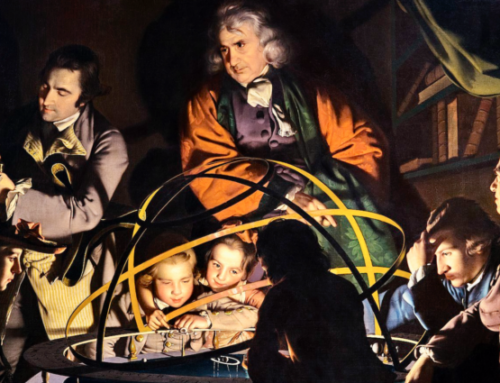Capitalism offers us outstanding new ways to be good. As a civilization, we should concentrate on taking advantage of these remarkable opportunities rather than entertaining idle suggestions, born of intellectual confusion if not sloth and envy, that the great boon of capitalistic plenty is undesirable or an illusion…
 Around the year 1885, the American economy became the largest in the world. From 1800 to 1885, the economy had grown in size thirty-one times over—an enormous increase that of necessity comprehensively changed the life of every American.
Around the year 1885, the American economy became the largest in the world. From 1800 to 1885, the economy had grown in size thirty-one times over—an enormous increase that of necessity comprehensively changed the life of every American.
The most significant and lasting change for the American people was the emerging condition of mass prosperity. For the first time in the history of the world, beginning a century and some ago, millions upon millions of people stood to have work that was so remunerative and efficient that the scramble to provide basic food, clothing, and shelter was no longer urgent. The necessities would come almost as a matter of course. Remuneration from work would increasingly fund saving and leisure goods—from recreational vehicles (first developed circa 1910) to vacations to fashions. There would be considerable leisure time too, as the workweek shrunk as a percentage of waking hours.
There had never been anything like it: millions of people rarely, if ever, at risk of destitution, being confronted by a panoply of goods and services that could enhance life far beyond the subsistence level. Whatever the depressions of the first half of the twentieth century (and our late Great Recession), the trend continued all the way to our own day. Since 1885, when the nation first bestrode the world economically, per capita income in the United States has increased by a factor of ten.
America justly considers its democratic and Constitutional tradition as its greatest contribution to the cause of civilization. Perhaps nearly as significant, however, is what it has shown to be possible with respect to living standards. America is the most fabulously prosperous civilization in the history of the world. This is especially so with respect to the dissemination of prosperity across its population. The American middle class simply became gigantic. This is an unambiguous accomplishment, and the obligation it entails is not to gainsay it, but to figure out how to live well given this happy precondition.
Our recent economic difficulties have led to a round of criticism of capitalism. Common questions run as follows: Does capitalism really deliver? Is it not prone to crisis? Are its gains not artificial and fated to vanish from the scene? Probing questions have their place, to be sure, but these seem to be based on sand. For the objective reality of American economic history is that prosperity—mass prosperity—came out of nowhere and ensconced itself decade upon decade, indeed century upon century. This is an epic achievement, and as such should be recognized for what it is, husbanded, and extended.
But let us consider these objections to our American capitalism. For starters, let it be clear that our economy is not prone to crisis in any ordinary sense of the term. Crisis in the pre-capitalist era inevitably meant not merely destitution, but famine. Famine is unknown in capitalist history. Whatever starvation and vagabondage came in the worst spate of capitalism’s history since the industrial revolution (the Great Depression), it was a universe away from famine.
As for capitalism not really delivering, the voices of the dead must be consulted. How many Americans have lived long, full lives, lives that are now over (so that their measure can be taken in full), lives that were in fact characterized by prosperity far above subsistence for their duration? The number surely runs into the hundreds of millions; therefore, capitalism has delivered. To say otherwise would be to call into question the complete actual experience of masses of individuals.
And as for capitalism’s gains being evanescent, the objection simply becomes strange as it gains its third century of age.
Instead of challenging capitalism and calling into question its manifest successes, we should strive to understand the special obligations and opportunities it presents. On Aristotelian grounds, the permanent successes of capitalism make possible two major advances. One regards techne and the other magnanimity.
Techne is the talent for being able to manipulate the physical things of this world for human benefit: use of tools and such. Capitalism’s comprehensive advance has vastly increased the scope of techne. We are capable of successfully working with the physical stuff of the world so much more than in the past. We not only can use simple tools now; we can splice genes, write computer code, and perceive the outer reaches of the universe. This is a blessing of capitalism: We can be better at one of our core human capacities.
Outside of pure thought, the greatest single virtue in Aristotle is magnanimity: gifts from one’s surplus for the public good. Traditionally, this virtue was limited to the few rich. But given capitalism’s extension of prosperity far beyond subsistence to masses of people, many more individuals can partake of this high virtue. Learning how to climb this ladder of improvement is the opportune task that capitalism’s success shows to us. Simply put, capitalism offers us outstanding new ways to be good. As a civilization, we should concentrate on taking advantage of these remarkable opportunities rather than entertaining idle suggestions, born of intellectual confusion if not sloth and envy, that the great boon of capitalistic plenty is undesirable or an illusion.
This essay was originally delivered in Free-Market Economy, an Intercollegiate Studies Institute debate (February 2011). It is republished here with gracious permission from The Intercollegiate Studies Institute.
The Imaginative Conservative applies the principle of appreciation to the discussion of culture and politics—we approach dialogue with magnanimity rather than with mere civility. Will you help us remain a refreshing oasis in the increasingly contentious arena of modern discourse? Please consider donating now.







“Famine is unknown in capitalist history”
Well, if you ignore the Irish Potato Famine, and the famines during the British rule of India that happened in 1769, 1783, 1791, 1837, 1860, 1865, 1868, 1873, 1876, 1896, 1899, and 1843, the 1944 famine in the Netherlands, the 1941-44 famine in Greece, the 1967 Swedish famine, then yes, I suppose capitalism has no history of famine.